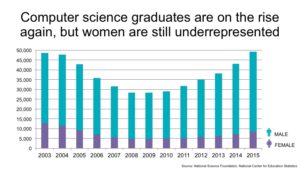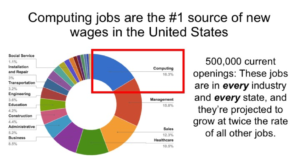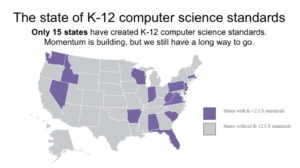Main Body
Chapter 7 – Code.org K-12 Computer Science Teacher Training Strategy by Tim Nunn
There is currently a disparity in Computer Science education. Computer Science graduates are finally recovering from a 6-year decline, but women are still underrepresented.

(Promote Computer Science, n.d.).
There are still not enough Computer Science graduates to fill job openings.

(Promote Computer Science, n.d.).
Yet only 15 states have K-12 Computer Science standards.

(Promote Computer Science, n.d.).
Code.org
Code.org is a nonprofit on a mission to grow K-12 Computer Science participation. Code.org was founded in 2013 and throughout the past 5 years provided K-12 schools and teachers with curriculum, resources, and tools for teaching Computer Science. One of the key strategies Code.org has established is the training of Computer Science educators. This grassroots movement has reached 25 million students through 750,000 teachers. “Over 72,000 U.S. teachers have attended Code.org workshops to teach computer science” (Code.org 2017 Annual Report, 2018).
Here are the numbers of new CS teachers trained by Code.org from 2013-2017:
| Code.org Goal | End of 2013 | End of 2014 | End of 2015 | End of 2016 | End of 2017 |
| Prepare new CS teachers across grades K-12 | N/A | 4,000 | 20,000 | 52,000 | 72,000 |
(Code.org 2017 Annual Report, 2018).
What is Code.org’s strategy for reaching so many teachers and students? In what ways are these Code.org trainings impacting Computer Science education and the teachers and students they are reaching?
Throughout this chapter we will explore the Code.org strategy for training teachers.
- What programs does Code.org have in place for training educators?
- Who are the teachers participating in the Code.org mission?
- Who are the educators providing these Code.org trainings?
- And, what kind of impact is Code.org having on how teachers teach Computer Science?
To help answer these questions, we will hear from four active participants in the Code.org strategy for training teachers.
(A. Kalthoff, personal interview, April 11, 2018).
Grades 6-10: CS Discoveries
The CS Discoveries Professional Learning Program is for grades 6-10 teachers interested in “teaching a semester or full-year” of the CS Discoveries course (CS Discoveries Professional Learning Program, n.d.). Admission into the program requires an application process where workshop participants require acceptance. The program begins with a 5-day summer workshop where teachers learn the CS Discoveries curriculum (Computer Science Discoveries, n.d.) through hands-on activities. Teachers are then required to participate in 1-day quarterly workshops throughout the school year to support their teaching. The CS Discoveries Professional Learning Program is free and may provide travel and meal expenses on occasion.
Grades 9-12: CS Principles
The CS Principles Professional Learning Program is for grades 9-12 teachers interested in teaching at least a semester of the CS Principles curriculum (Computer Science Principles: What is CS Principles?, n.d.). Similar to the CS Discoveries Professional Learning Program, admission is required. Teachers begin with a 5-day summer workshop and participate in 1-day quarterly workshops throughout the school year. The 5-day workshops are held throughout the country.
For example, in August 2017 Code.org held three summer workshops where 1,300 middle and high school teachers in Philadelphia, Phoenix, and Houston. During these workshop, teachers “studied curriculum and learned the lessons their students would be attempting in the coming school year.” The program also included “sessions on how to recruit classrooms that are as diverse as their school as a whole, as well as sessions that highlight the importance of providing a positive environment where any student could find success” (1,300 middle and high school teachers take on computer science, 2017).
Let’s here from Annette Lang, a teacher who participated in a Code.org CS Principles training program.